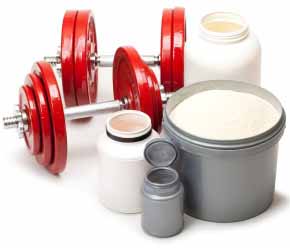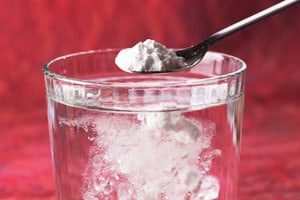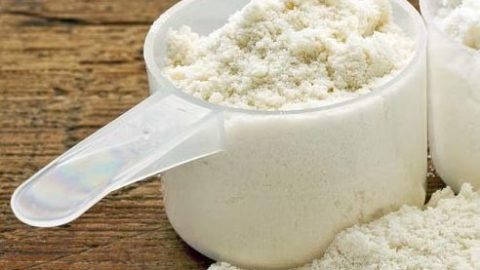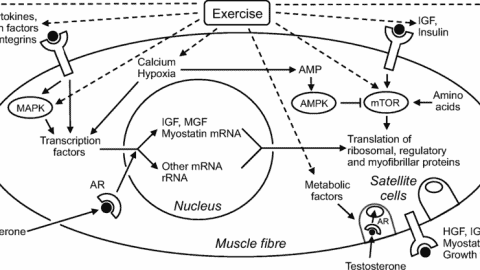Creatine is one of the few dietary supplements that have a very solid scientific support for its efficacy in increasing strength, explosive performance and muscle mass. So the question in not whether it is effective, but rather how to supplement it to reap maximal effectiveness?
There are several theories on how to take creatine; some say you should load and then lower the dose to maintenance, while others say you can get good results by a constant low dosage regimen without loading. Yet others say you should cycle the creatine and take breaks from it in between cycles. And then we have the issue of dosages and how to ingest it. In addition, there is a lot of confusion about the myriad for creatine forms that claim to be superior over the gold standard creatine monohydrate – the form that was used in research which proved its efficacy. Are the new fancy creatine-super-duper formulations really worth their price? Let’s tackle all theses creatine issues here…
Creatine forms
When creatine first came out on the market it was creatine monohydrate. This is also the form of creatine that has been used in all the scientific studies which showed that creatine increases performance and muscle growth. Because creatine rapidly became so popular, manufacturers came up with different creatine variants and started to make specific claims that their creatine formula is superior. Not so! Don’t let yourself get fooled and ripped off! Stick to the golden standard creatine monohydrate. For more info on different creatine forms and formulation, check out Will Brink’s article “The Creatine Grave Yard”
Creatine supplementation protocols
There are basically three creatine supplementation protocols. Here’s an overview of them with recommended effective dosages:
Loading followed by Maintenance protocol
Loading phase:
Supplement with 0.3 g creatine/kg body weight/day (0.14 g/lb/body weight/day) for 5-6 days to maximize muscle creatine stores.
Maintenance phase: Supplement with 0.03 g creatine/kg body weight/day (0.014 g/lb/body weight/day) thereafter to maintain elevated muscle creatine stores.
Low-Dose protocol
Supplement with 3-5 g creatine per day.
Cycling protocol
Load/maintain for 12-16 weeks, and then take a break for 3-6 weeks. After the break, start another cycle with the loading phase followed by a maintenance phase followed by a break for a desired numbers of cycles.
 Most studies that have shown performance enhancing effects used the creatine loading protocol. The purpose the creatine loading is to maximize creatine storage in the muscles. The magnitude of the increase in muscle creatine content is important because studies have reported that performance improvements are dependent on the increase in muscle creatine (1, 2). In a typical creatine loading phase, a dose of 20-30 g creatine (5-6 g taken four times per day) is taken during 5-6 days (3, 4).
Most studies that have shown performance enhancing effects used the creatine loading protocol. The purpose the creatine loading is to maximize creatine storage in the muscles. The magnitude of the increase in muscle creatine content is important because studies have reported that performance improvements are dependent on the increase in muscle creatine (1, 2). In a typical creatine loading phase, a dose of 20-30 g creatine (5-6 g taken four times per day) is taken during 5-6 days (3, 4).
To find out your optimal loading dose, multiply your body weight in pound (lb) with 0.14 (or multiply your body weight in kg with 0.3). Thus, for a male weighing 220 lb (100 kg) and a female weighing 140 lb (63 kg), the appropriate loading dose is 30-31 g (220×0.14 or 100×0.3) and 20 g (140×0.14 or 63×0.3), respectively. Thereafter,a maintenance dose is taken with the purpose to maintain the elevated muscle creatine stores. A maintenance dose corresponding to 0.03 g/kg/body weight/day (0.014 g/lb/body weight) is enough to maintain elevated muscle creatine levels (4). To find out your optimal maintenance dose, multiply your body weight in pound (lb) with 0.014 (or multiply your body weight in kg with 0.03).
Thus, for a male weighing 220 lb (100 kg) and a female weighing 140 lb (63 kg), the appropriate maintenance dose is 3 g (220 x 0.014 or 100 x 0.03) and 2 g (140 x 0.014 or 63 x 0.03), respectively. Some people might prefer a slightly higher maintenance dose of 5 g per day. Cessation of creatine maintenance doses after loading causes muscle creatine stores to return to baseline within 4-6 weeks (4-8).
An alternative supplementation protocol is to ingest 3-5 g creatine per day (with no loading phase) for at least 28-30 days (4, 9). Studies have shown that this method can increase muscle creatine levels as effectively as the creatine loading (4). However, this low-dose creatine supplementation will result in a more gradual and slower increase in muscle creatine levels compared to the more rapid loading protocol, and it will therefore take longer before any performance enhancement will be noticeable. The constant low-dose creatine supplementation protocol is only beneficial for people who cannot do the loading phase because of for example a busy working schedule. Also, while loading dosages of 20-30 g creatine per day are well tolerated in the majority of individuals, some can experience gastrointestinal upset (such as diarrhea and a bloating) when large daily dosages of creatine are consumed (10-12). For those people, the constant low-dose creatine supplementation protocol is the way to go. Some somach discomfort can occur if creatine is incompletely dissolved before ingestion (12). Thus, make sure to dissolve the creatine powder properly, especially if you are taking larger doses.
Listen to Will Brink’s take on loading versus not loading.
Finally, we have the cycling protocol of creatine supplementation (13-15). One argument behind creatine cycling is that it will keep the body’s ability to synthesize creatine, intact. However, while the body’s endogenous synthesis of creatine (which amounts to about 1 g per day (16, 17)) is decreased during creatine supplementation (8), cessation of creatine supplementation merely causes the creatine levels in the body to return to baseline (4, 5). If creatine supplementation were to permanently decrease the body’s capability to synthesize creatine, the creatine levels in the body would have dropped to below baseline (pre-supplementation) levels, which would have caused an increased fatigue and loss of strength. This does not happen (5, 6, 8, 14, 18, 19).
Thus, cycling of creatine supplementation has no scientific foundation and is not warranted. It confers no advantage over loading + chronic maintenance. Continuous creatine supplementation without cycling actually might confer multiple health benefits (which I will cover in a separate upcoming article).
For more check out Will Brink’s great video on creatine cycling.
The Importance of dissolving your creatine before ingestion 
This is the most common mistake people who take creatine do; they put it in their cold protein shakes and scoop it down. However, this isn’t a very smart thing to do because creatine has to be dissolved in order for the body to absorb all of it. This will also prevent stomach upsets. And to dissolve creatine, it has to be put into warm (not boiling!) water and stirred. If you cannot get really warm water from the tap (or if you are drinking bottled water), heat up the glass in the micro for a minute and then dissolve the creatine in it.
I personally dissolve my creatine like this before going to the gym (I add in beta-alanine as well in the same water) and drink it when I get back home from the gym. By then it has cooled down to room temperature. I mix in 2 packets of stevia for flavor, as I’d puke drinking plain lukewarm water. Of course, you can mix in some protein powder if you want (just don’t put it in the fridge, see below).
Will has done a great video on the importance of dissolving creatine.
Usually, 5 g creatine should dissolve in about 2/3 glass of water. if you take more creatine, you have to add more water. Note that you cannot put the glass with your dissolved creatine in the fridge, as it will cause the creatine to precipitate, which ruins the whole point of dissolving it in the first place. The reason for this is that – stated in scientifically terms – the solubility of a solute (creatine) is a function of the temperature of the solvent (water). Thus, dissolve your creatine AND drink it dissolved (i.e. not cooled down as that will cause the creatine to precipitate).
Bottom Line
When supplementing with creatine most folks will get most benefit from the classic loading / chronic maintenance supplementation protocol. For maximal muscle absorption effect, ingest your creatine with high GI carbs and protein (13, 20). Also, take the majority of your creatine during the loading phase after your workouts, and during the chronic maintenance phase take the whole 3-5 g dose post-workout.
The reason for this is that co-ingestion of creatine, protein and carbohydrates increases muscular retention of dietary creatine (13, 20). And when creatine is ingested after workouts the uptake of creatine into muscles is further increased, likely due to increased muscle blood flow and nutrient delivery, and results in even greater muscle thickness (3, 21-23). And remember to dissolve your creatine before you ingest it, which will prevent stomach upset and help your body absorb more of it.
———————————————————————————————————————————————–
About Monica Mollica > www.Ageless.Fitness

Monica Mollica holds a Master degree in Nutrition from the University of Stockholm / Karolinska Institue, Sweden. She has also done PhD level course work at renowned Baylor University, TX.
Having lost her father in a lifestyle induced heart attack at an age of 48, she is specializing in cardiovascular health and primordial/primary prevention. She is a strong advocate of early intervention in adolescence and young adulthood, and the importance of lifestyle habits for health promotion at all ages.
Today, Monica is sharing her solid medical research insights and real-life hands on experience and passion by offering nutrition / supplementation / exercise / health consultation services, and working as a medical writer, specializing in health promotion, fitness and anti-aging.
She is currently in the process of writing a book on testosterone, covering health related issues for both men and women.
———————————————————————————————————————————————–
References:
1. Greenhaff, P.L., et al., Effect of oral creatine supplementation on skeletal muscle phosphocreatine resynthesis. Am J Physiol, 1994. 266(5 Pt 1): p. E725-30.
2. Greenhaff, P.L., et al., Influence of oral creatine supplementation of muscle torque during repeated bouts of maximal voluntary exercise in man. Clin Sci (Lond), 1993. 84(5): p. 565-71.
3. Harris, R.C., K. Soderlund, and E. Hultman, Elevation of creatine in resting and exercised muscle of normal subjects by creatine supplementation. Clin Sci (Lond), 1992. 83(3): p. 367-74.
4. Hultman, E., et al., Muscle creatine loading in men. J Appl Physiol, 1996. 81(1): p. 232-7.
5. Vandenberghe, K., et al., Long-term creatine intake is beneficial to muscle performance during resistance training. J Appl Physiol, 1997. 83(6): p. 2055-63.
6. Febbraio, M.A., et al., Effect of creatine supplementation on intramuscular TCr, metabolism and performance during intermittent, supramaximal exercise in humans. Acta Physiol Scand, 1995. 155(4): p. 387-95.
7. Lemon, P., et al., Effect of oral creatine supplementation on energetics of during repeated maximal muscle contraction. Med Sci Sport Exer, 1995. 27: p. S204.
8. Williams, M.H., R.B. Kreider, and J.D. Branch, Creatine: The Power Supplement. 1999, Champaign, IL: Human Kinetics Publishers.
9. Burke, D.G., et al., The effect of continuous low dose creatine supplementation on force, power, and total work. Int J Sport Nutr Exerc Metab, 2000. 10(3): p. 235-44.
10. Juhn, M.S. and M. Tarnopolsky, Potential side effects of oral creatine supplementation: a critical review. Clin J Sport Med, 1998. 8(4): p. 298-304.
11. Juhn, M.S., J.W. O’Kane, and D.M. Vinci, Oral creatine supplementation in male collegiate athletes: a survey of dosing habits and side effects. J Am Diet Assoc, 1999. 99(5): p. 593-5.
12. Poortmans, J.R. and M. Francaux, Adverse effects of creatine supplementation: fact or fiction? Sports Med, 2000. 30(3): p. 155-70.
13. Buford, T.W., et al., International Society of Sports Nutrition position stand: creatine supplementation and exercise. J Int Soc Sports Nutr, 2007. 4: p. 6.
14. Kreider, R.B., B.C. Leutholtz, and M. Greenwood, Creatine, in Nutritional Ergogenic Aids, I. Wolinsky and J. Driskel, Editors. 2004, CRC Press: Boca Raton, FL. p. 81-104.
15. Kreider, R.B., Creatine, in Sports Nutrition: Fats and Proteins, J. Driskell, Editor. 2007, CRC Press: Boca Raton, FL. p. 165-186.
16. Walker, J.B., Creatine: biosynthesis, regulation, and function. Adv Enzymol Relat Areas Mol Biol, 1979. 50: p. 177-242.
17. Wyss, M. and R. Kaddurah-Daouk, Creatine and creatinine metabolism. Physiol Rev, 2000. 80(3): p. 1107-213.
18. Kreider, R.B., et al., Long-term creatine supplementation during training/competition does not increase perceptions of fatigue or adversely affect health status. Med Sci Sport Exer, 2002. 34: p. S146.
19. Candow, D.G., et al., Effect of ceasing creatine supplementation while maintaining resistance training in older men. J Aging Phys Act, 2004. 12(3): p. 219-31.
20. Steenge, G.R., E.J. Simpson, and P.L. Greenhaff, Protein- and carbohydrate-induced augmentation of whole body creatine retention in humans. J Appl Physiol, 2000. 89(3): p. 1165-71.
21. Preen, D., et al., Creatine supplementation: a comparison of loading and maintenance protocols on creatine uptake by human skeletal muscle. Int J Sport Nutr Exerc Metab, 2003. 13(1): p. 97-111.
22. Robinson, T.M., et al., Role of submaximal exercise in promoting creatine and glycogen accumulation in human skeletal muscle. J Appl Physiol, 1999. 87(2): p. 598-604.
23. Chilibeck, P.D., et al., Effect of creatine ingestion after exercise on muscle thickness in males and females. Med Sci Sports Exerc, 2004. 36(10): p. 1781-8.






This is a nice survey article, thank you. You suggest that loading gives an advantage in faster ramp-up, but I for one think that the 30 or so days it may take at 3-5g daily dose to ramp-up is not significant in a weight training program (excluding high-end competition which is not in my experience). Unfortunately you leave out the specifics and refer only to a “more gradual and slower increase” for the steady dose (see text below). My own experience is that a 5g dosage takes less than a month to show a positive effect.
I am not convinced there is any real advantage to loading for most of us.
The comment about dissolving in WARM water is critical, once I started doing that I said goodbye to any GI discomfort.
Any more detail or thoughts on this would be appreciated.
“Studies have shown that this [steady dosage] method can increase muscle creatine levels as effectively as the creatine loading (4). However, this low-dose creatine supplementation will result in a more gradual and slower increase in muscle creatine levels compared to the more rapid loading protocol, and it will therefore take longer before any performance enhancement will be noticeable
I’m glad to hear dissolving the creatine took care of your GI issue.
I recommend creatine loading for everybody (except those with sensitive stomachs). it doesn’t do any harm, so why wait to get the full effect?
No need to load, whats the Rush? some people need to learn patience in life, your body will be fully saturated with the creatine eventually before the month is up
Good article..
It finally removed my doubts on wether cycling would be important or not..
Just a question.. i had the idea that the Creatine would slowly turn into creatinine when dissolved in water, hence it wouldn’t be wise to disolve it so long before drinking it, is this right or just a myth ?
Thx
What happens to the creatine if you put it into boiling water such as a cup of green tea? Great article!
Creatine does degrade to creatinine; however this process is slow, more in the time frame of days. A few hours is not an issue.
I’m glad you got your question on cycling answered 🙂
Thx 4 the help.. loving your articles.. keep it up !!
Slowly is the key word there. It will convert to creatinine over time, but hours sitting in water is a non issue there.
Thx, will deffinitly give it a try 😉
Good solid article. Aside from possible GI discomfort, I would think that even dry powdered creatine (as in capsules) should sufficiently dissolve in the warm digestive juices within the stomach and GI tract. Pre-dissolving seems more of a convenience than a necessity. Thoughts?
If you are using warm water and micronized creatine, it dissolves easily. For people who get stomach upset, non responders (approx 30% of users) they may get better responses from fully dissolving. It’s not a black/white issue.
Clearly, some of the creatine not dissolved in the glass will be made soluble and absorbed, but it’s well established in human digestion that compounds with poor solubility are often poorly absorbed. It’s also going to be dose dependent (large amounts of CM are more likely to not get solubalized and absorbed, causing stomach issues, etc) while smaller amounts, less so.
If one has gotten good response from not fully dissolving, don’t sweat it, but it’s my opinion that fully dissolving optimizes absorption, reduces waste, may improve effects in non responders, and will reduce stomach discomfort in those who experience it with creatine.
It’s also going to be individual. Back when loading was all the rage, some got killer cramps, the runs, and a bloated stomach from those mega doses, some had no issues.
Are we supposed to ingest the creatine solution while it’s still warm/hot?
I’ve been mixing mine in hot water in a glass and then mixing it into my pre/post workout shake with dextrose, whey protein and cold water. I do this the night before the workout so it cools to room temperature but doesn’t go in the fridge.
I’m now wondering if this is working?
As I described in the article; yes, you can let it “cool” down on the counter, but don’t put it in the fridge.
The cold water you add when mixing in your whey probably won’t cause a significant precipitation, so you’re fine.
Your way seems good, but I wouldn’t let it sit overnight. if possible, dissolve in a few hours before you drink it.
I’ve been mixing my CM with warm water to mix, however, I then put the mix in the freezer to turn to a slushy substance which really tastes good during and after a hard workout in its cold form. Am I defeating its purpose this way?
Yes. As described in the article, you are precipitating your creatine.
Hey Will. Had one question. Ive been useing creatine for 9yrs. Ive always put it in boiling water. Ive had great results this way. But u say warm tap water. Will the boiling water take some of the affect away
Don’t have the info as to how high a temp it takes to effect the creatine, but i’d opt for hot water (like as hot as you could drink without burning your mouth) vs boiling temps.
Before I started taking creatine I was 184 lbs. Now Im 235 lbs. Ive been lifting hard for a long time. The results paid off. At age 57 I still carry a 19 inch arm naturaly and making sure the rest of me is all proportioned. I hoping to enter this body building meet coming up. I said all this because of the creatine. With the proper nutrishon and creatine I would not be where Im at today. I put your avdvice into action and let you no of any change.
Monica, why can’t you dissolve creatine in boiling water? what happens?
Everything will be destroyed, deformed, rendered non effective, at some temp. The melting point of CM is 255 °C, 528 K, 491 °F. so above boiling water, but conversion to creatinine is temp, PH, time dependent, and so generally recommended that dissolving creatine in water hot enough for quick dissolving (hot tap water temp say) is sufficient without subjecting the creatine to boiling water temps best.
You’d probably have to boil creatine for a long time to really “damage” it as a molecule per se, but why bother? Hot tap water faster and easier. End of the world if you really wanna put it in boiling water and drink shortly there after?
Probably not.
Hey Monica,
Thanks for the great article.
It has showed me that I am totally taking it wrong as I have been taking (5g) and only on hard training days ( twice a week) and pre workout on an empty stomach thinking it was giving me added ability and endurance for the coming workout ( my workouts are mainly swimming with some strength training done after the workout but in the pool -not solid weight training). I also do not dilute in warm water or wait for it to dissolve so it seems I have been wasting my time and money. I love your reading your work and am in awe of your knowledge.
Thanks so much for sharing such great, helpful info
I’m glad the article helped you figure it out 🙂
Hi there
What if my water supply is old (over 10 years.) and the warm water pipe releases contaminants/metal particles every time you pour warm water off the tube? I heard this from my HVAC friend. I do not want ingest too much of potential anti-health compounds 🙂
Am I majoring the minor? I’d choose to heat fresh water, if water temp has to be above room temp.
You could either heat you usual fresh bottled water or boil your tap water and wait for it to cool a couple of minutes 🙂
We use a water filter on our tap water used for drinking and cooking, this pretty much filters out everything and is a good long term investment.
Read articles “What’s In Your Water?” here.
Just get a counter top carbon filter; I have one myself. They do a good job filtering out heavy metals and chloride etc.
Can’t it be taken straight into mouth, mix it with spit and swallow? Then afterwards flush it with warm liquid?
Hi Monica,
Thanks for your research.
I add my creatine to green tea, whats your opinion on this?
Yes the tea is not boiling, I add a little cold water to cool for drinking temp. however do you think this would damage the creatine? (creapure)
That should be fine. Or just let is “cool” down on the counter.
Does it affect it greatly if put into boiling water, as I put mine in my green tea and some times coffee.
Can you explain why powder form is better than liquid and pills? Thanks!
Power is better because you can dissolve it. And it is cheaper.
Dissolved creatine eventually degrades (we’re talking about a time-frame of days-weeks, not hours), which is why I don’t recommend the liquid version.
Can i mix my powdered glutamine and powdered glycine in hot water as well?.
Thank you very much for the valuable information. Will the loading phase be applicable also to the Kre-Alkalyn kind of creatine?
Kre alk is covered in other articles here and is not superior to CM.
Hi, nice recommendations and it’s great you consulted the scientific literature. Overall really enjoyable post! Came across this in google on page one so it shows your content is good!
Kevin
Hi, nice recommendations and it’s great you consulted the scientific literature. Overall really enjoyable post! Came across this in google on page one so it shows your content is good! I take 3-5g daily in my green tea as I find this keeps me saturated enough to see performance benefits.
Kevin
For those of us who consume a moderate amount of red meat (say, about 1/3 pound a day), would we still need approximately a 5 gram maintenance level of creatine per day, generally?
Great article, and thanks
PS…I also consume several eggs a day and a helping of fish (like salmon or sardines). Not sure if these help much in the creatine department, but figured I’d try to provide any possible key info. Thx
I agree with not mixing the creatine with your protein shakes. I’ve gotten great results from taking creatine seperately.
You contribute very good articles. My comment has to do with a special issue with my use of creatine.
I have chronic high blood pressure (first measured that way when I was about 8… I am now 66). I am addressing it by high potassium/low sodium diet, and exercise with lots of sweat. And stress reduction. My Question Is: I used to take creatine for many years and then read that it will contribute to increasing the high blood pressure, because as I understand it, it makes the heart beat harder. Is this true? And is there a workaround, if so? My main reason to take was to delay sarcopenia (muscle loss) associated with aging. Therefore my dosage was not weight-lifting level.
Thanks for addressing this comment.
Good information.Thanks
Is there any info on creatine being spoiled by airborne fungus, bacteria, etc? I have a 4.4 lb jar of it, which is taking forever to finish. Opening the jar up every day has me wondering: Perhaps it’d be best for me to re-package it small bags(?)
Will,
I purchase a protein powder from Life Extension that has whey protein, glutamine and creatine. I usually have 3 scoops which is about 6 grams of creatine. Do you think creatine in this form is being absorbed or would you recommend that I take creatine on it’s own?
The recommendation to pre dissolve it is really directed at those who experience GI problems from it. If you find the LEF whey/Cr/Glut mixture works for you and causes no stomach issues, I’d say stick with it. It’s likely being absorbed fine.
Combination products are ok for maintenance, which only requires a daily dose or 4-6 g creatine per day.
For people who have not taken creatine before, a loading period with a dose around 20 g creatine/day for 5-7 days is recommend for faster onset of effect.
For creatine loading, an isolated creatine monohydrate powder is best and most practical.
I should add, glutamine is over-hyped. Unless you are critically ill and extremely catabolic, don’t waste your money.
Another great article from Monica! Simply explained, sufficiently supported and well reasoned. Thank you! O
Thanks Bruce. 🙂
I always take my creatine before working out. I thought it didn’t matter whether it was taken before or after your workout?
Timing does not matter, but most take it post workout, Take when ever most convenient.
Very nice summary; as usual.
DJS MD,JD
I’m puzzled by this. Apparently you wouldn’t have the article but it seems like the creatine would dissolve at body temperature, no ?
If you use heated water, in my case coffee has been the experiment – wondering if it is too hot degrading the creatine…. just what temp should it be ?
But then if it moves to solution at say 105 degrees but then it cool to 98.6 in the stomach ???
oops just now saw the zillion posts
Only 1.5 million 🙂
Hey Monica:
Always look forward to your articles. Like Will… you always bring the trurth to bodybuilding…
Over the past 5 years I’ve tried creatine on 3 separate occassions and experience hair thinnng
each time forcing me to stop taking creatine. Very frustrating as I get great results on creatine.
A search on the web confirms that many users has had the same issue. Any scientific events to
support this.
Actually, yes http://www.ncbi.nlm.nih.gov/pubmed/19741313
This study shows in college-aged rugby players that creatine supplementation may increase conversion of T to DHT, and elevate DHT:T ratio.
And as I’m sure you know, DHT is a main contributor to androgenic alopecia:
http://www.ncbi.nlm.nih.gov/pubmed/25254005
Hey Will,
This article from Monica is filled with “Golden Nuggets” of info on exactly how to use Creatine safely and effectively. It’s a template for taking creatine.
I even figured out the formula for figuring out how many grams I should take for the loading and maintenance phase. Loading(25.20) Maintenance (2.43)
Thanks guys.
As usual, a most excellent article! I am a 59 year old body builder and have never used creatine . . . for a number of reasons, mainly due to the varied “bro science” opinions. However, based upon the findings of Monica’s thorough research, I am now going to use that supplement and look forward to and will monitor the results. Thanks again.
Great information in a concise format. Thank you.
A couple questions:
1) A couple people (fitness bloggers, etc.) have recommended products using Kre-Alkalyn creatine as opposed to creatine monohydrate. These products claim that a couple grams of Kre-Alkalyn is equivalent to 10 grams of creatine monohydrate. Am I correct in understanding that you dispute this claim and see no increase in effectiveness to Kre-Alkalyn creatine?
2) I have been using creatine monohydrate capsules rather than powder. Am I limiting the effectiveness of the creatine by using it in this form given that it is not being dissolved in water as recommended in the article?
Thanks again.
Matt
Hi Monica,
Great article on loading creatine, I have a question…you mentioned when loading to take most of the creatine post training is that 1 dose of 24g ? my daily loading dosage – or split it to 4 x 6g through the day?
Thanks
Chris
During loading I suggest taking around 10 g post-workout, and the rest evenly split over the day.
Hey Monica, hey Will! Thanks for your great quality articles about Creatine! I use creatin 5g every day. My father is 71 and I would love that he also uses Creatin (5g/day for cognition, prevention of muscle loss). As he had some arterial problems in the past, the physicians prescribed him to take aspirin every day….
I asked them about Creatine but they dont habe much knowledge about it. Therefore my question: Is it safe when he takes 5g of Creatine every day or are there any negative interactions with aspirine?
You would help me a lot 🙂
All the best and keep up the great work!
Tobi
My comment and request represents possibly represents a small portion of your readership.
I am a senior that started using a maintenance dose of creatine because of comments about prevention of sarcopenia. It was an article written by Will Brink for Life Extension Foundation. Then I stopped using it for a while, then started playing a sport which made my muscles and joints exceedingly sore and achy for a few days. There was never full recovery. Then, in analysis, I thought I was producing a lot of lactic acid with the exercise, found an article about creatine and lactic acid, resumed using it, and immediate improvement. Also, as a senior, I am concerned about heart and brain health a bit more. It seems there are some benefits there too.
So, as I believe you faithfully attempt to separate fact from fiction, would it be possible to have a creatine article targeting the older group? It is my feeling that many of the many aches and pains and accidents of becoming older could be reduced, maybe eliminated. I don’t know how well this is being studied. And everyone gets older. Why suffer?
You can find my many articles on the benefits of creatine for aging populations, etc on this site and more on the Life Extension Foundation site by running my name in the search box.
Not sure if Monica plans to cover the topic, but she has several articles here on “successful aging” on this site you will find on a search.
thx for the article very helpful, I want to know if is it ok to take fat burners (hydroxycut) during the morning and have creatine for the afternoon workout is there any problem with that? will they both work? any advice I would really appreciate if you answer me cause there is a lot of misinformation around thx
Such a great article I like your site and bookmark it so I can visit here again & again keep it up #Monica
Thanks for the great article. As always, good info. I had read recently elsewhere, that the body can only absorb about 2-3 grams at a time. I’m skeptical of that after reading this. I’m sure there are a variety of factors. The dissolving makes good sense.
Will, you had been putting it in your “Bomb Proof” coffee. Does that still confer benefit?
Would I add it to the coffee if it didn’t confer benefits? 😉